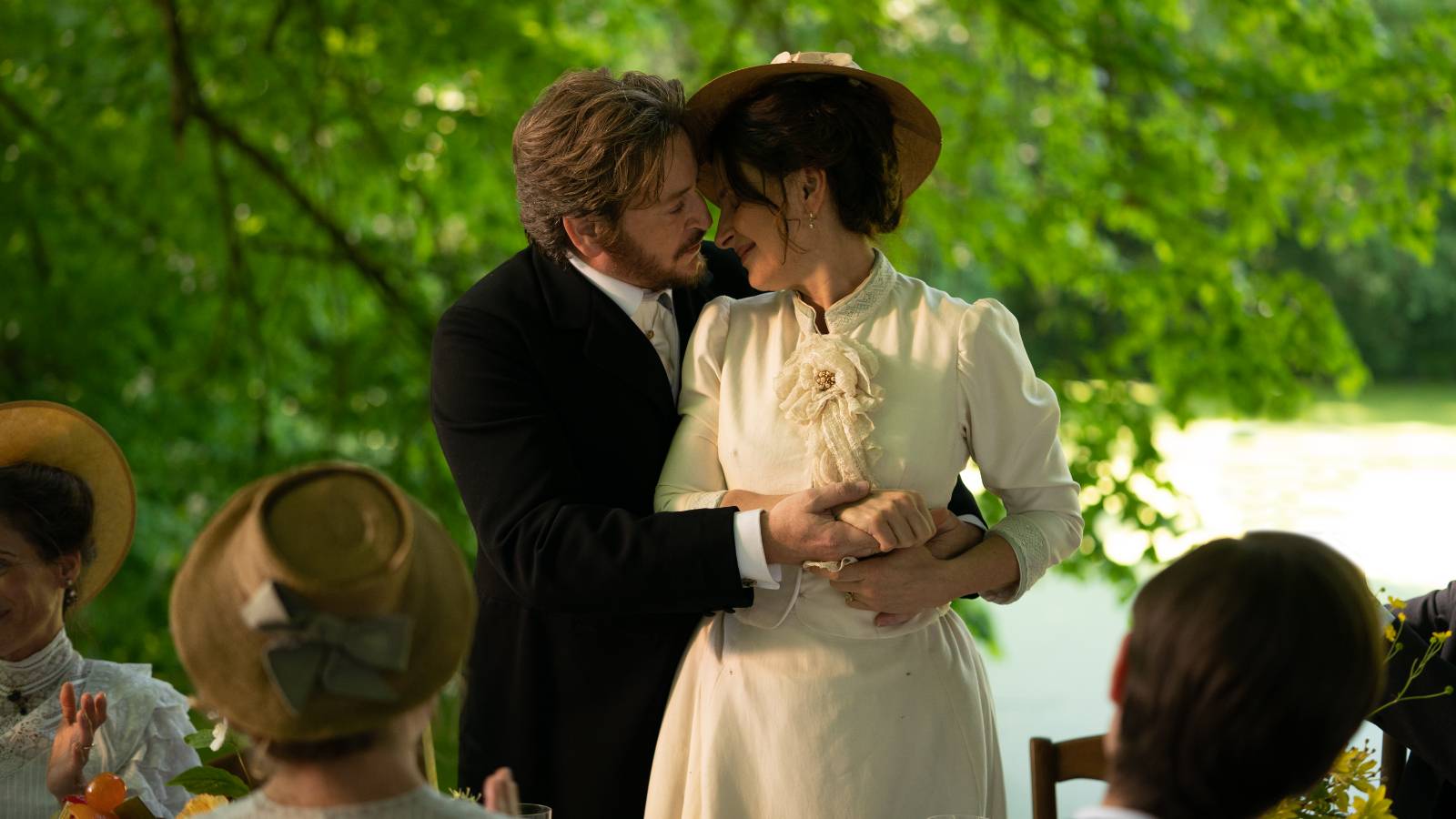In a conversation with Eugénie (Juliette Binoche) gourmet Dodin Bouffant (Benoît Magimel) quotes Saint Augustin. “Happiness is desiring what you already have.” Trần Anh Hùng’s exquisite adaptation of gastronomic historian and novelist Marcel Rouff’s ‘La vie et la passion de Dodin-Bouffant’ illustrates that happiness is an intricate recipe pared down to provide pleasure and nourishment. Happiness is harmony, balanced flavours, unspoken understanding, and desiring nothing more than to exist in a sunlit moment.
For twenty years Dodin has lived with his master cook and occasional lover Eugénie, a woman who knows him so intimately that she can translate his menus into dishes as if they are connected with a single mind. Hùng’s opening to the Belle Époque drama starts at dawn where Eugénie collects fresh produce for a magnificent meal Dodin will be presenting to his coterie of fellow epicureans. Through Jonathan Ricquebourg’s stunning and naturalistic cinematography we experience perhaps the most compatible kitchen in cinema for many years. Along with maid of all work Violette (Galatea Bellugi) and her new to the mansion cousin Pauline (Bonnie Chagneau-Ravoire), Dodin and Eugénie chop, strain, stuff, roast, filet, with precision and a haptic pleasure that is enhanced by the complete lack of music. The diegetic sounds of steam, sizzling fat, clanging utensils and pans are the symphony to accompany the multifarious and mouth-watering dishes.
Dodin has been long in love with Eugénie who has thus far refused his proposals. Eugénie’s contentment is to speak through her food and to make her own choices. To change their arrangement would perhaps mean changing the essence of who they are together; a pair whose consonance exists through gentle routine and passion for all the culinary arts. Dodin’s reputation is that of the “Napoleon, Prince, or King” of French haute cuisine. Eugénie is his interpreter, most trusted taster, and confidant. She abhors fuss and laughs when Pauline, a natural cook in the making relates that she is termed an artist by Dodin’s intimates. “They talk nonsense,” Eugénie replies and then shows the young girl who she considers to be a great artist – Antoine Carême, a man who came from poverty to be the most renowned chef in France.
There is a bucolic perfection to the world of The Taste of Things. Even the poor do not appear poor. Lush and plentiful is the world Dodin and Eugénie inhabit. A world where Dodin can take his friends on a hike to eat ortolan in the traditional manner straight from the kitchen of an amiable neighbour. It is as if the outside world barely exists beyond the sensual pleasures afforded by Dodin’s wealth and position. Dodin is a man who can afford to turn down an invitation to dine with the Prince of Eurasia (he does not) and quibble about the vacuity and pretentiousness of the menu. In return he will invite the Prince to dine on a Pot-au-Feu (basically boiled meat and vegetables, a peasant’s dish). It’s an audacious decision but Dodin is convinced that with Eugénie’s alchemic touch it will be gold.
Eugénie is hiding, or at least minimising, a serious illness. She refuses to let her health dull Dodin’s wit or warmth and insists maintaining the joie de vivre of their household. However, her illness prevents her from attending to the kitchen and gives Dodin the opportunity to cook for her. Watching Dodin craft a pastry crisp is akin to observing a master artisan glassblower shape their precious and fragile design. The meal is Dodin’s ultimate seduction and when Eugénie finds an engagement ring in the peaked cream of the dessert she finally relents and agrees to marry him.
One may not know their Baked Alaskas from their croquembouches or be like Pauline and taste twenty flavours out of twenty-two in a sauce. The Taste of Things delivers many culinary history lessons in addition to the glorious food designed by Pierre Gagnaire with Michel Nave as on set chef, and it doesn’t truly matter what one understands as a gastronome. What is universal is the desire to nourish and be nourished by a soul who is sympatico.
Juliette Binoche has not lost a scintilla of her alluring beauty which also dazzled over twenty years ago in the magic realist food related film Chocolat. One can believe that her former real-life partner Benoît Magimel is hungry for every glimpse of her and derives as much elation from watching her eat and cook as he does in sexual congress with her.
Dodin may claim that “The discovery of a new dish will be more important to humanity than the discovery of a new star,” or that being a gourmet is impossible for the young and the prodigious talents of Mozart do not compare. Yet in Trần Anh Hùng’s rapturous world of life and love served on a platter such declarations make sense in the communion between extended abundance. The Taste of Things is ultimately a fantasy world of abundance: but it is delicious filmmaking with a winning recipe of the act of sharing cultivated and embodied life with all its sweet and bitter flavours.
Director: Anh Hung Tran
Cast: Juliette Binoche, Benoît Magimel, Emmanuel Salinger
Writer: Anh Hung Tran, (Based on the novel by Marcel Rouff)



